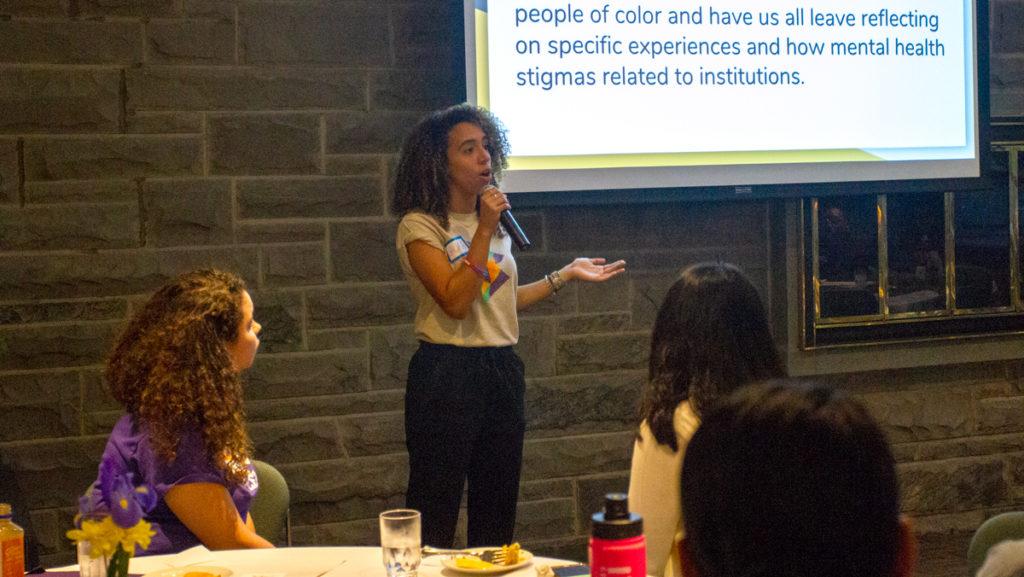The first cohort of BOLD scholars launched a new initiative centered on the mental health of people of color in a kickoff event Oct. 11.
The program is titled “Engaging Mental Health in People of Color (EMPOC)” and is the first project the BOLD scholars have organized. The Ithaca College BOLD Women’s Leadership Network, founded by President Shirley M. Collado, is a four-semester program for female-identifying students that promotes leadership, critical thinking, diversity, networking and facilitating change.
EMPOC is the BOLD scholars’ campus transformation project, which is a staple of the BOLD program. Campus transformation projects are created, planned and executed by the scholars themselves, and the projects address issues on campus that engage students, faculty and staff in an attempt to create meaningful and long-lasting change for the college community.
Senior BOLD Scholar Chasia Bambo said the cohort decided to focus on mental health in people of color because it is an issue that needs to be addressed but is often ignored on college campuses.
“Our cohort was looking for something to bring to IC that was different and something that was needed,” Bambo said. “We noticed that mental health on college campuses isn’t always addressed, and when it is, the mental health of students of color is often overlooked. We wanted to make it clear that mental health isn’t something that is one size fits all and that it is very much shaped by one’s identities.”
The kickoff event, which took place in Klingenstein Lounge in the Campus Center, was an interactive discussion facilitated by Tynesha Wright-Lindo, a social worker at Family and Children’s Service of Ithaca. Approximately 50 students attended.
The event began with icebreaker activities in which statements were read aloud, and those who identified with them stood up and were applauded. Another activity involved attendees drawing what their concepts of mental health looked like.
Wright-Lindo began the discussion by saying that she helps people of all ages at Family and Children’s Service and that a surprising amount of people struggle with their mental health, so students should not feel alone when discussing these issues.
“A lot of people are going through a lot of things all the time,” Wright-Lindo said.”
Wright-Lindo said she defines mental health in a similar way to how physical health is defined.
“Mental health is like your physical health in the sense that you’re working to your maximum potential — you’re working as you should,” she said. “You’re seeing things and thinking about things in a generally positive light.”
Wright-Lindo presented three questions to the attendees, which were, “How does your family address mental health?”, “Has your mental health changed since attending the college?” and “Does being a person of color at a predominantly white institution affect your mental health?”
Many students of color said they felt a culture shock when they first arrived at the college because the majority of the student body is white. Other students emphasized the importance of spaces for people of color, like the lounge for the Center for Inclusion Diversity Equality and Social Change (IDEAS) in the Campus Center.
According to the Office of Analytics and Institutional Research, 75.4 percent of students enrolled in Fall 2017 were white, while 19.2 percent of students were ALANA — or African American, Latino, Asian American and Native American
Wright-Lindo then brought up the topic of self–care and provided a list of ways to practice it.
Sophomore BridgeUp Scholar Angelina Randazzo said she came because she thought the information she learned from the event could help her in her future career.
“I plan on being an educator, and so I want to learn more about my students and any issues they could be going through and find ways that I could help,” Randazzo said.
Senior Tatiana Jorio said she finds that having a space to discuss mental health is important, especially because mental health is not often discussed in her household.
“I think it’s really important to talk about mental health and self–care, specifically because my mom is a Dominican immigrant, and mental health isn’t really something we talk about, and I’m not really in a lot of spaces where I can talk about mental health with people who understand,” Jorio said.
Sophomore BridgeUp Scholar Aliyah Brathwaite said she was curious to see how a program made by people of color, for people of color, could help create discussion and change in the college’s community of people of color.
“I wanted to see how they were going to approach the intersectionality of mental health and people of color, especially since it’s a dialogue that is for us, by us, and that it’s not a dialogue dictated by people who don’t necessarily know the ins and outs of our experience,” Brathwaite said. “I wanted to see what people within the community could produce to facilitate conversation with other people in the community.”
She said that the topic of mental health in people of color is important to her because it is often overlooked in her community and that she thinks it is necessary to begin having these conversations.
“We face so much, as people of color, in terms of institutionalized racism, marginalization, oppression and internalizing that, along with the other things that any human goes through, is a lot,” Brathwaite said, “It’s so overlooked in the community, so it’s important to start talking about it because just because it’s being overlooked doesn’t mean that it’s not being experienced.”
EMPOC is a year-long program and more events will be taking place throughout the 2018–19 academic year.








